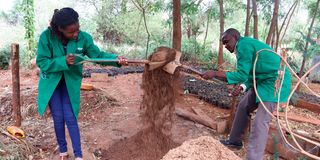Organic farming can efficiently revive depleted soils

What you need to know:
- In 2021, Sri Lanka President Gotabaya Rajapaksa ordered the banning of importation of synthetic fertilisers and pesticides, forcing farming communities to go organic.
- The move was aimed at saving some $400 million the country was spending annually on synthetic fertilisers and other farm inputs.
As Kenya prepares to host the 2023 Africa Fertiliser and Soil Health Summit next month, local entrepreneurs and experts are calling for reduced dependency on food and fertiliser imports.
According to the recently released 2023 Africa Agriculture Status Report, which is authored by several experts from across the continent, the steps to reduce dependency (on imports of farm inputs) include increasing local and regional trade using local currencies.
The report highlights the need of investing in a local production of crop nutrients and seeds, and mobilising local capital for food systems investments. However, John Macharia, AGRA ’s Country Manager for Kenya, warns that the transition has to be done cautiously to avoid the catastrophic situation that befell Sri Lanka when the country went 100 per cent organic.
In 2021, Sri Lanka President Gotabaya Rajapaksa ordered the banning of importation of synthetic fertilisers and pesticides, forcing farming communities to go organic. The move was aimed at saving some $400 million the country was spending annually on synthetic fertilisers and other farm inputs.
However, it proved counterproductive and disastrous after yields reduced by almost 52 per cent, forcing the government to review the new policy.
“We must start with soil test campaigns across the country to understand the soil nutrient deficiencies and levels of soil acidity before recommending short, medium and long-term strategies for rebuilding the soils, and this should be a continuous process,” said Mr Macharia.
A recent study on the Sri Lanka situation conducted by the UN World Food Programme finds that a gradual cut down of agrochemicals with a long-term plan on the adequate supply of organic fertilisers and other organic-based alternatives is prudent rather than an immediate and comprehensive shift to exclusive organic farming.
According to Esther Bett, the executive director at Recourses Oriented Development Initiative, an organisation that has introduced the use of fermented organic fertiliser known as Bokashi in 35 prisons across the country, transitioning from synthetic to organic fertilisers in highly nutrient-depleted soils cannot happen overnight.
“It is not cheap as many people may assume,” said Ms Bett.
She noted that unlike synthetic fertilisers, which provide nutrients for the crop to consume at once and leave the soil depleted waiting for another round of fertiliser application, organic fertilisers usually provide important macro and micronutrients to the soil, which help it to self-generate the important nutrients and make them available to the crops over a period of time and for several seasons.
“It is the most sustainable way of farming, but it requires sufficient time and patience,” Ms Bett said.
“That is why we encourage smallholder farmers to begin with a small portion of their land depending on their ability. One can start with as small as a quarter of an acre. Once the land is rejuvenated, they can move to another quarter.”
For farmers with completely depleted soils, Ms Bett advised that they begin with reasonable quantities of organic fertilisers and then keep reducing the volumes every season.
“After a few seasons, the soils become fertile and go back to their original state, able to produce food without any form of fertiliser input,” she said.
So far, entrepreneurs in different parts of the country have been using different innovative techniques to produce different forms of nutrient-rich fertilisers, the knowledge that the country can leverage to start producing organic fertilisers at an industrial scale.
Through a project known as Reduce-Reuse-Recycle Rice Initiative for Climate Smart Agriculture (R4iCSA) and indigenous knowledge, Kilimo Trust has been training local entrepreneurs on the production of Biochar fertiliser by recycling rice husks, which have for years been regarded as waste material.
As a result, along the Makutano – Embu road on the periphery of the expansive Mwea Rice Irrigation Scheme in Kirinyaga County, several youths can easily be spotted using portable kilns to carbonise piles of rice husks in a controlled oxygen environment, which is then treated with particular soil microbes to become soil nutrient rich Biochar-based fertiliser.
Mr Samuel Rigu, the founder of Safi Organics which is producing the fertiliser in Mwea, said his team is able to produce up to six tons of biochar every day.
Apart from soil fertility, the other problem bedevilling Africa’s food system is soil acidity.
A recent publication to assess the extent of the liming situation in Kenya shows that 13 per cent (7.5 million hectares) of Kenya’s soils are acidic, which translates to approximately 63 per cent of Kenya’s arable land.





